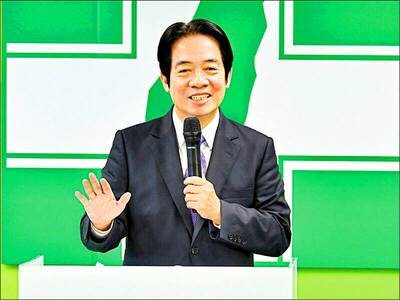Which director is capable of making a record-breaking blockbuster out of a tale about a balding, middle-aged man’s search for true love? The answer is Feng Xiaogang (馮小剛). After his lavish period saga The Banquet (夜宴) and war drama Assembly (集結號), the genre-crossing wizard has made a confident return to what he was originally known for — ironic comedies set in contemporary China — with If You Are the One (非誠勿擾).
Co-starring Feng’s long-time collaborator, Chinese actor Ge You (葛優), with Taiwanese actress Shu Qi (舒淇), the romantic comedy revolves around an unlikely couple whose relationship begins with a blind date, endures much sparring and ultimately leads to deeply felt affections. Its huge box-office success — the movie earned roughly US$50 million — cements Feng’s reputation as China’s foremost purveyor of popular comedies.
In the opening scene, which delivers a good laugh at the expense of China’s nouveau riche, onetime inventor Qin Fen (Ge) sells his Conflict Resolution Terminal, basically a plastic tube, to a foolish venture capitalist (played by Chinese comic Fan Wei (范偉)). With his newfound wealth, Qin focuses his attention on finding a wife to make his life complete.
As he goes from one blind date to another, Qin encounters plenty of unsuitable matches who include a gay man, an erotic-phobic widow and a woman who tries to sell graveyard plots during the date. Eventually, he meets Liang Xiaoxiao (Shu), a flight attendant languishing in a love affair with a married man (played by Hong Kong’s Alex Fong (方中信)).
Qin immediately realizes the beautiful Xiaoxiao is out of his league. Nevertheless, the two end up having a drink and confiding painful pasts to each other, assuming they will never see each other again.
But fate draws them back together and Qin tries to win Xiaoxiao’s heart with tactics he takes care to stage in an effortless fashion. It seems to work and Xiaoxiao, softened by his persistence, invites Qin on a trip to Japan’s picturesque Hokkaido.
Director Feng once again proves his mastery of satire and humor when it comes to observing Chinese society in the midst of changing times. The script is smartly written, filled with snappy dialogue, enjoyable sarcasm and dry wit. Though the blind dates provide much comedy in the first half of the film, Feng pokes fun at modern-day notions of dating, romance and marriage. A few caricatures that stand out include a pregnant young woman (played by Taiwan’s Vivian Hsu (徐若瑄)) desperately seeking a husband and a businesswoman who habitually compares men to stocks.
The narrative becomes a bit too discursive in the second half of the film when the two leads build on their mutual affections during their trip to Hokkaido. It feels disappointing, at times, to see that Ge’s charming antics alone are not enough to produce the emotional weight the journey demands. An offbeat coda, which makes meta-references to the global economic crisis, feels at odds with the rest of the movie.
The film wouldn’t be as successful if the main roles had been played by lesser actors. A charismatic leading man, Ge is admirably adept at mixing sincerity with cynicism, conceit with self-disapproval. Shu proves herself an able match for her veteran costar, and the two share a terrific chemistry that is delivered throughout the film.

Ahead of incoming president William Lai’s (賴清德) inauguration on May 20 there appear to be signs that he is signaling to the Chinese Communist Party (CCP) and that the Chinese side is also signaling to the Taiwan side. This raises a lot of questions, including what is the CCP up to, who are they signaling to, what are they signaling, how with the various actors in Taiwan respond and where this could ultimately go. In the last column, published on May 2, we examined the curious case of Democratic Progressive Party (DPP) heavyweight Cheng Wen-tsan (鄭文燦) — currently vice premier

On Facebook a friend posted a dashcam video of a vehicle driving through the ash-colored wasteland of what was once Taroko Gorge. A crane appears in the video, and suddenly it becomes clear: the video is in color, not black and white. The magnitude 7.2 earthquake’s destruction on April 3 around and above Taroko and its reverberations across an area heavily dependent on tourism have largely vanished from the international press discussions as the news cycle moves on, but local residents still live with its consequences every day. For example, with the damage to the road corridors between Yilan and

May 13 to May 19 While Taiwanese were eligible to take the Qing Dynasty imperial exams starting from 1686, it took more than a century for a locally-registered scholar to pass the highest levels and become a jinshi (進士). In 1823, Hsinchu City resident Cheng Yung-hsi (鄭用錫) traveled to Beijing and accomplished the feat, returning home in great glory. There were technically three Taiwan residents who did it before Cheng, but two were born in China and remained registered in their birthplaces, while historians generally discount the third as he changed his residency back to Fujian Province right after the exams.

Few scenes are more representative of rural Taiwan than a mountain slope covered in row upon row of carefully manicured tea plants. Like staring at the raked sand in a Zen garden, seeing these natural features in an unnaturally perfect arrangement of parallel lines has a certain calming effect. Snapping photos of the tea plantations blanketing Taiwan’s mountain is a favorite activity among tourists but, unfortunately, the experience is often rather superficial. As these tea fields are part of working farms, it’s not usually possible to walk amongst them or sample the teas they are producing, much less understand how the